Contents
Market Overview
Macro Review
The Core Personal Consumption Expenditure (PCE) Price Index, the Federal Reserve’s preferred inflation measure, eased to 4.4% YoY in December, from 4.7% in the prior month. This was in line with market expectations and marked the slowest pace in over a year. Markets have reacted positively, interpreting the disinflation trend as grounds for the Fed to decrease the pace of rate hikes to 25bps from 50bps at the next FOMC meeting on February 1. For its part, the Bank of Canada hiked by 25bps this week (as expected) and explicitly signaled a pause to assess the impact of tightening thus far, fueling optimism that most major central banks are getting closer to ending their rate hiking cycles. Meanwhile, following a string of soft U.S. data releases, concerns about a potential recession by mid-year in the world’s largest economy appeared to be on the rise. Nevertheless, oil and the broader commodities complex traded well, supported by continuing optimism around China’s reopening. The week was busy for emerging market central banks with a number of policy rate decisions: Nigeria surprised markets with a higher than expected 100bps hike, while South Africa sharply slowed the pace of monetary tightening to 25bps from 75bps amid revising its 2023 growth forecast materially lower. Elsewhere, Pakistan is preparing for an IMF visit to unlock critically important disbursements, Ghana moved closer to reaching a deal on domestic debt restructuring, and El Salvador repaid its bulky sovereign bond maturity, clearing the first major emerging markets debt repayment hurdle for this year.
EM Credit Update
Emerging markets sovereign credit (cash bonds) ended the week 0.3% higher with spreads 3bps tighter. Corporate credit was +0.9% this week with spreads 6bps tighter. Sovereign outperformers over the week were Zambia, Tajikistan, and Egypt, while Sri Lanka, Tunisia, and Ecuador underperformed.
The Week Ahead
Another week when central bank meetings will be in focus, dominated by the Federal Reserve’s decision due on Wednesday, February 1. Market expectations for a slower pace of 25bps have been firmed by this week’s inflation data. As for the European Central Bank (ECB), a 50bps hike appears to be a near certainty and consensus expects a move of similar proportion by the Bank of England (BoE). In Turkey, January inflation data will likely show another large YoY drop of CPI from elevated levels, driven by strongly favorable base effect. In Asia, markets will get PMI data from China and India and look for further signs that economic activity in China is set to pick up as re-opening takes hold.
Highlights from emerging markets discussed below: South Africa surprises with slowed pace of hikes, Pakistan prepares for upcoming IMF visit, Ghana moves closer to domestic debt deal and El Salvador pays $600mm sovereign bond on time and in full.
Fixed Income
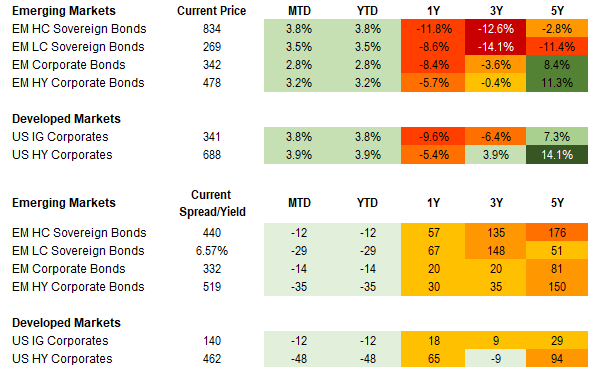
Equities
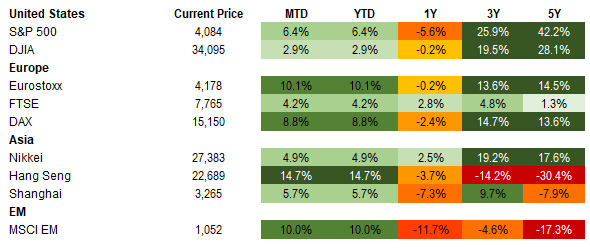
Commodities

Source for data tables: Bloomberg, JPMorgan, Gramercy. EM Fixed Income is represented by the following JPMorgan Indicies: EMBI Global, GBI-EM Global Diversified, CEMBI Broad Diversified and CEMBI Broad High Yield. DM Fixed Income is represented by the JPMorgan JULI Total Return Index and Domestic High Yield Index. Fixed Income, Equity and Commodity data is as of January 27, 2023 (mid-afternoon).
Emerging Markets Weekly Highlights
South Africa surprises with slowed pace of hikes
Event: The South African Reserve Bank (SARB) hiked its policy rate by 25bps to 7.25% down from a pace of 75bps at the previous meeting with three votes for 25bps and two votes for 50bps (vs. market consensus for 50bps). This follows last week’s softer than expected December CPI print of 7.2% y/y as well as ongoing loadshedding driving the Central Bank to materially lower its 2023 growth forecast to 0.3% from over 1.1%.
Gramercy commentary: South Africa’s inflation trajectory is comparatively more benign and thus, we anticipate the SARB to have greater room to pause its hiking cycle as prices continue to ease and growth slows further. While the impending tariff hikes coupled with still elevated inflation and latent risk of political noise leave the door open for another 25bps increase, we think we are nearing the end of the hiking cycle. Looking forward, investor focus will shift to the upcoming 2023 budget speech next month, where long awaited details on Eskom support are anticipated.
Pakistan prepares for upcoming IMF visit
Event: The IMF is set to visit Pakistan from January 31st to February 9th to discuss the pending 9th review and roughly $1.1bn disbursement under the existing EFF program. The authorities have indicated they are willing take actions to meet the IMF requirements to complete the review, starting with a 7.5% depreciation of the rupee this week. The other key area under discussion will be fiscal policy including subsidies and tax revenue raising measures.
Gramercy commentary: We expect the authorities and IMF to make progress towards completion of the 9th review in the coming weeks, likely with a disbursement by the spring IMF meetings, helping to moderately support bond prices. However, the balance of payment fragilities, particularly in the context of very low import cover in conjunction with ongoing political uncertainty, leave room for volatility between now and elections. If political risk recedes in the aftermath of elections, we see prospects for a constructive outcome whereby the government secures additional multilateral and bilateral financing and addresses its debt maturities in a largely investor friendly manner.
Ghana moves closer to domestic debt deal
Event: The Government amended its domestic debt exchange proposal increasing the 2023 coupon to 5% from zero, catalyzing participation from domestic banks. Non-bank holders have yet to agree to the terms ahead of the upcoming January 31st deadline.
Gramercy commentary: We see the development as constructive and another step towards conclusion of the domestic debt restructuring. While we see room for the offer to continue to get extended and tweaked into February, we think we are nearing the end of the process from a domestic standpoint. This should pave the way for increased momentum on external debt negotiations and IMF board approval on the $3bn ECF program by the spring IMF meetings.
El Salvador pays $600mm sovereign bond on time and in full
Event: The Government of El Salvador repaid the remaining $600mm on its 2023 global bond on time and in full. The bond had an original principal amount of $800mm but was reduced by a successful debt buy-back in 2022.
Gramercy commentary: The timely repayment of the 2023 maturity re-confirms what we believe to be very strong willingness to pay by President Nayib Bukele’s Administration. Our view is that the authorities’ market-friendly approach will remain intact in the run-up to general and Presidential elections in early 2024 despite a difficult relationship between the Bukele government and external stakeholders such as the IMF and the Biden Administration. We also expect that a constructive approach toward international investors is likely to persist beyond the elections in which the highly popular Bukele could be re-elected in a landslide. In terms of ability to continue to meet external debt obligations, it would be a function of careful liquidity management and adherence to what has been an impressive “home-grown” fiscal consolidation in 2021-22. Considering the importance of maintaining stable economic and political conditions in El Salvador’s small open dollarized economy heading into the electoral cycle, we see strong incentives for the Administration to continue on the path of fiscal pragmatism.
Emerging Markets Technicals
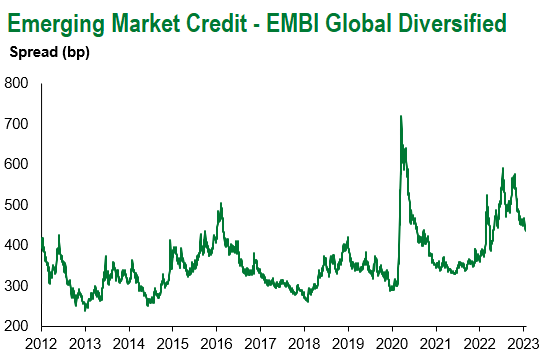
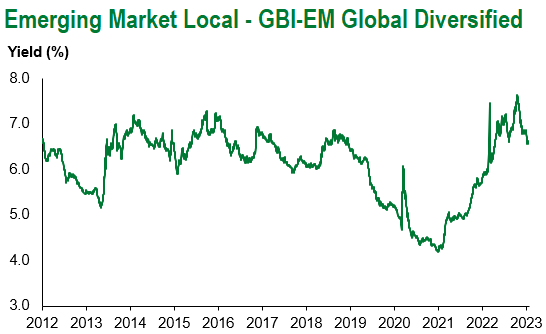
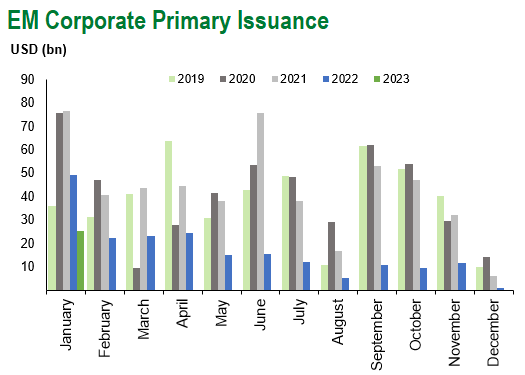
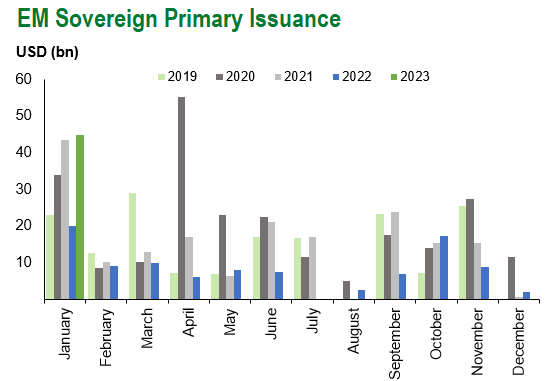
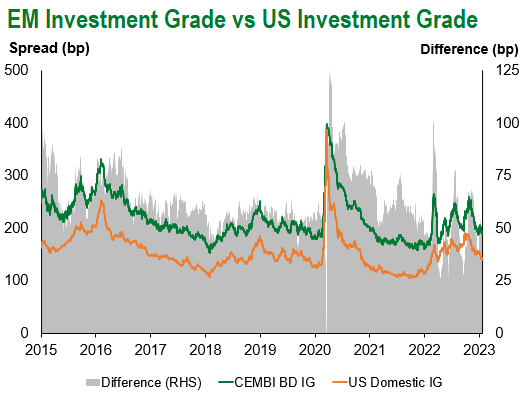
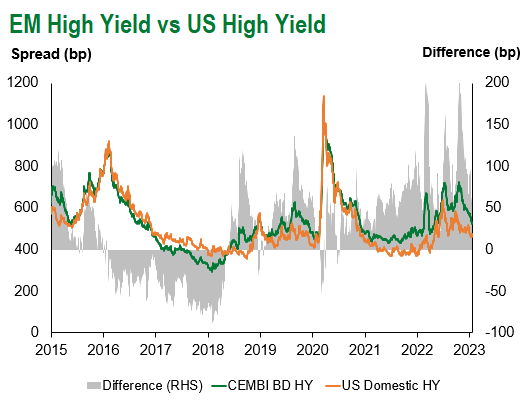
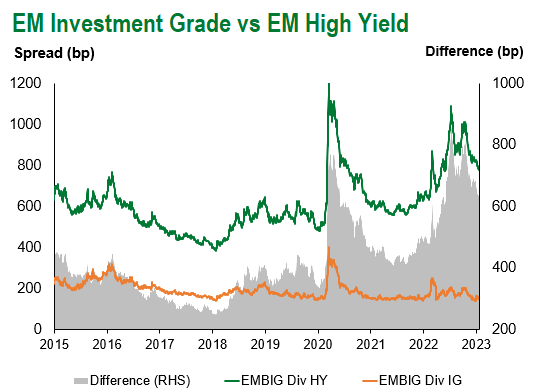
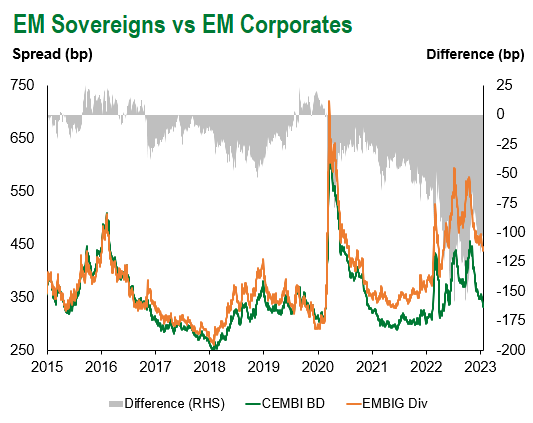
Emerging Markets Flows
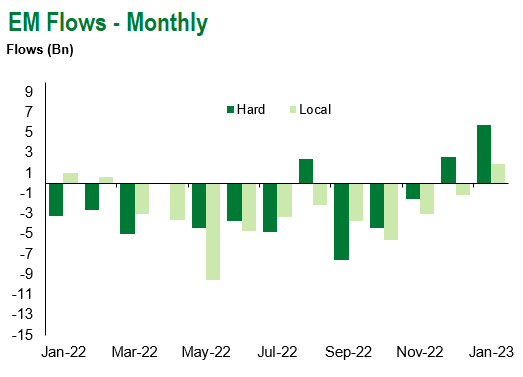
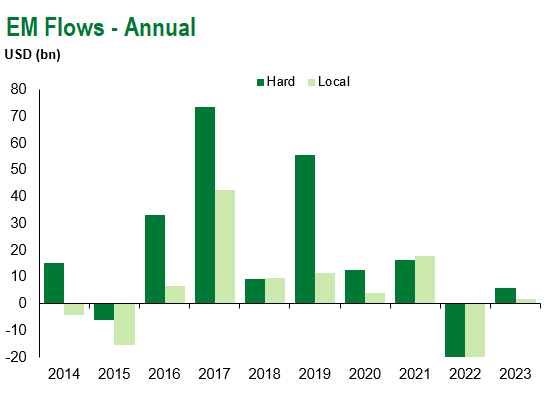
Source for graphs: Bloomberg, JPMorgan, Gramercy. As of January 27, 2023.
COVID Resources:
Johns Hopkins COVID-19 Case Tracker
For questions, please contact:
Kathryn Exum, CFA ESG, Director, Co-Head of Sovereign Research, [email protected]
Petar Atanasov, Director, Co-Head of Sovereign Research, [email protected]
James Barry, Director, Deputy Portfolio Manager, [email protected]
This document is for informational purposes only. The information presented is not intended to be relied upon as a forecast, research or investment advice, and is not a recommendation, offer or solicitation to buy or sell any securities or to adopt any investment strategy. Gramercy may have current investment positions in the securities or sovereigns mentioned above. The information and opinions contained in this paper are as of the date of initial publication, derived from proprietary and nonproprietary sources deemed by Gramercy to be reliable, are not necessarily all-inclusive and are not guaranteed as to accuracy. This paper may contain “forward-looking” information that is not purely historical in nature. Such information may include, among other things, projections and forecasts. There is no guarantee that any forecasts made will come to pass. Reliance upon information in this paper is at the sole discretion of the reader. You should not rely on this presentation as the basis upon which to make an investment decision. Investment involves risk. There can be no assurance that investment objectives will be achieved. Investors must be prepared to bear the risk of a total loss of their investment. These risks are often heightened for investments in emerging/developing markets or smaller capital markets. International investing involves risks, including risks related to foreign currency, limited liquidity, less government regulation, and the possibility of substantial volatility due to adverse political, economic or other developments. References to any indices are for informational and general comparative purposes only. The performance data of various indices mentioned in this update are updated and released on a periodic basis before finalization. The performance data of various indices presented herein was current as of the date of the presentation. Please refer to data returns of the separate indices if you desire additional or updated information. Indices are unmanaged, and their performance results do not reflect the impact of fees, expenses, or taxes that may be incurred through an investment with Gramercy. Returns for indices assume dividend reinvestment. An investment cannot be made directly in an index. Accordingly, comparing results shown to those of such indices may be of limited use. The information provided herein is neither tax nor legal advice. Investors should speak to their tax professional for specific information regarding their tax situation.
